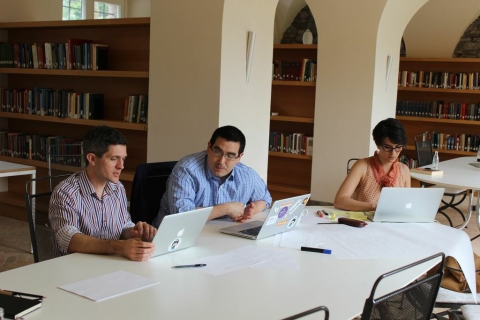
A group of experts discussed ways to make the power of open data matter to citizens during the CodeCamp Bellagio event in Italy.
From May 19 through 30, 2014, ICFJ brought together experts from around the world to the Rockefeller Foundation's Bellagio Center in Italy to find ways to use data to advance quality journalism. Ben Colmery helped organize this key summit.
His report:
There is no question that open data is opening new doors to improve people’s lives. Initiatives by governments, multilateral organizations, NGOs and hacker groups have bolstered its potential by creating a flood of data and apps.
But what, of it all, has shown tangible success? What works, what doesn’t? Who are the most effective drivers? How do we get governments to care? How do we get media to care? How do we work with them? How do we make open data matter for everyday citizens and solve real problems that people face? How do we hack digital tools to enhance the broader open data movement?
We brought together a select group of experts (check out the Twitter list) from around the world to help find answers at “CodeCamp for the Globe: Using Data to Strengthen Citizen Voices” from May 19-30 at the Rockefeller Foundation’s Bellagio Center in Italy. The first week, we focused on strategy, with representatives from various “Code for” movements (Africa, America, Europe, Caribbean, UK, Germany), universities, media in Latin America and Asia, funders such as the World Bank and the Gates Foundation, government and a few others. The second week, we brought rotated in hackers from various continents and, well, hacked.
When we first conceived this event, our starting point was Code for Africa, a movement founded by our Knight International Journalism Fellow Justin Arenstein. It had shown great success at sparking the use of open data to give people access to actionable information. For instance, hundreds of thousands of people were able to register for elections in Kenya, Zimbabwe and Malawi thanks to the GoToVote Web and mobile apps. It does so by embedding expert programmers and data analysts into media and civil society organizations (CSOs). Supported by external citizen tech labs, the embedded experts have helped organizations build demand-driven data applications, and the internal systems to continue creating data projects after the experts have gone. This has transformed media, in particular, from traditional news organizations to information providers that close many of the gaps government has proven unable to fill, “going where government won’t.”
Code for Africa clearly pointed to a model for success. Bellagio, therefore, would be the perfect opportunity to organize an event to take a deeper look at how its strengths could be amplified and influential more globally.
Initiatives like Code for America and Code for Europe have employed a similar strategy to Code for Africa by embedding technologists into local government agencies to help make them more data-driven and close their gaps in public service. Because they have addressed the same basic societal problems as Code for Africa - with the main difference that they are “government facing” as opposed to “media/CSO facing” - there must be lessons we could learn from each other, we thought, and ways we could work together to make the other stronger.
Yet, with the “Code for” movement still somewhat new, these groups had largely operated outside of one another, with few opportunities to come together. We seized on this, realizing Bellagio could be a chance to build linkages and come away with a vision for how to strengthen the overall open data movement. This led to the decision to invite “Code fors” from around the world to the strategy session, along with other related stakeholders, such as government, media, NGOs, tech and universities - all critical to driving open data.
We also wanted to get hackers and designers to Bellagio, because the code itself is such a critical piece. And a CodeCamp without coders is just a camp.
It was to be more than just a hackathon. The idea was to have technologists from each of the regions and many of the groups represented in the first week who could bring knowledge and ideas for hacks that could both have a wider impact on the open data community.
Thirty-three people, in all. Nineteen people each week. Five carried across.
Over these two weeks, the conversation was electric, thanks to such a dynamic and diverse group of people at just the right size. We dug deep into critical issues, asked tough questions and found consensus. New collaborations and ideas emerged. Exciting tools were hacked.
Most importantly, a large, fragmented world got a little smaller, better connected and smarter.
Author’s note: This is the first in a series of posts that will highlight key thinking and outcomes of the CodeCamp at the Bellagio Center.